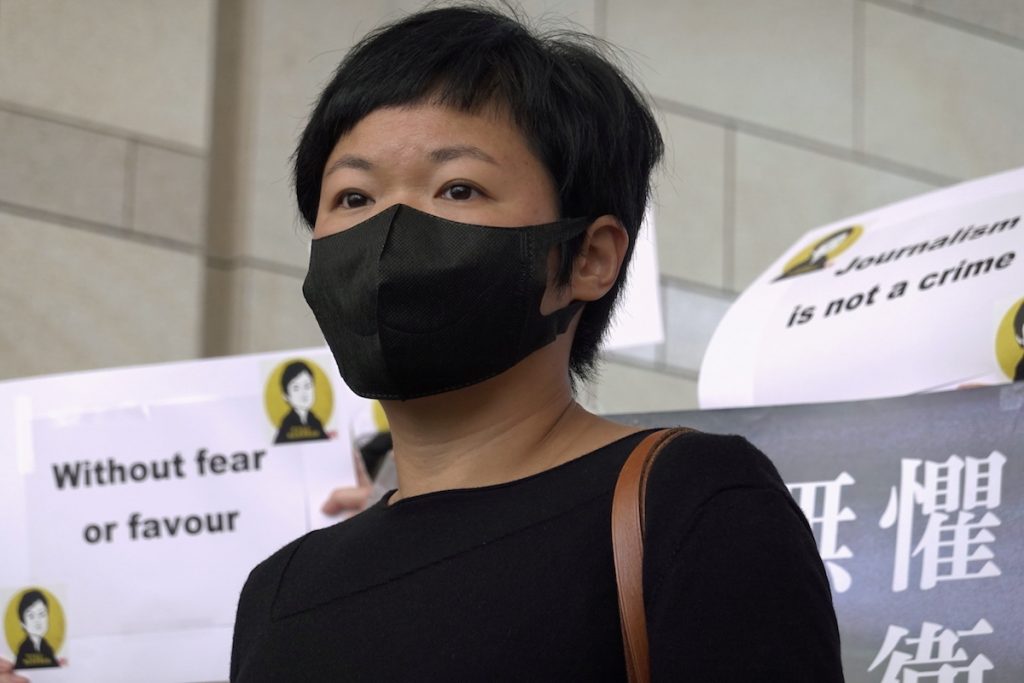A Hong Kong court’s conviction of an investigative journalist sets a dangerous precedent that will deter routine reporting, the city’s Foreign Correspondents’ Club has said.
West Kowloon magistrates’ court found Bao Choy guilty on April 22 of making false statements to obtain data for a documentary on the police handling of a mob attack targeting pro-democracy protesters, reporters and bystanders in 2019.
The case has fueled concern over a crackdown on press freedom in the Chinese-ruled city, which has become increasingly authoritarian after a sweeping national security law imposed last year.
The Foreign Correspondents’ Club (FCC), Hong Kong, issued a statement that strongly condemned the prosecution of the 37-year-old award-winning freelance producer with public broadcaster RTHK.
“The government’s actions against Choy set a dangerous precedent,” the FCC said in a statement. “They open the door to further legal action against journalists for engaging in routine reporting. They will also deter journalists from accessing legally available public records in Hong Kong.”
The club said that while Choy will not go to jail, she will be left with a criminal record and be forced to pay an HKD 6,000 (US$774) fine for only doing her job.
Choy’s fine was for violating a road traffic ordinance. She had pleaded not guilty.
In delivering the verdict, court judge Ivy Chui accused Choy of misrepresenting herself and asked her to find other ways to seek the information she needed for her report, claimed the FCC.
During court proceedings, Chui said the “regulations are not intended to allow the public to obtain vehicle particulars without limitations.”
“The goal was to find the car owner’s name and address for an interview,” the judge said. “Interviewing and reporting are not related to traffic and transport purposes.”
However, the FCC said that government has narrowed the categories of who could access the data in question and why.
“It is clear that Choy was singled out and punished for a search that is routinely conducted by journalists in Hong Kong,” the club said.
“Choy’s documentary investigated the actions of police during an attack on protesters and commuters that took place at the Yuen Long MTR station on July 21, 2019,” they added.
“While we appreciate that the judge overseeing the case spared Choy jail time, citing the merits of her reporting and the public interest involved, we wish the prosecutors had shown similar restraint and never brought this case in the first place.”

The 2019 attack in the northern Yuen Long district — when more than 100 men in white T-shirts hit people with sticks and poles at a train station — struck a particularly sensitive nerve with many in Hong Kong.
The courts have yet to convict any of the attackers. Police have made 63 arrests over the attack, charging eight of the mob, media tallies show.
Police charged seven others present that night, including former democratic lawmaker Lam Cheuk-ting, with rioting. Lam was hospitalized after being wounded as he livestreamed the attack.
Officers were severely criticized for what pro-democracy activists and rights groups called a slack response, with some accusing them of colluding with triad gangsters.
Police have rejected the claims, blaming the slow response partly on protests elsewhere in the former British colony that had drained resources.
For the documentary, which was played in court as evidence, RTHK obtained data on the ownership of some cars seen in video footage on the night, in a bid to trace those behind the assault and highlight the alleged slow response of police.
The “7.21 Who Owns the Truth” investigation won Hong Kong’s Kam Yiu-yu Press Freedom Award on April 21, RTHK said, citing a panel member as saying, “The report raised important leads that the people in power refused to respond to.”
RTHK did not accept the award, the broadcaster said.
The government has rejected criticism that Choy’s arrest, and an overhaul of RTHK led by a bureaucrat with no media experience, represented a crackdown on press freedom.
Hong Kong’s powerful police commissioner, Chris Tang, is among those who have called for laws against “fake news”.
Reporters Without Borders ranks Hong Kong 80th among 180 countries in terms of press freedom, in freefall over the past decade.
The FCC last week condemned an attack on the Hong Kong edition of The Epoch Times’ printing presses by for men who smashed equipment with sledge hammers on April 12.
With Reuters
You can watch “7.21 Who Owns the Truth” in the RTHK video below.